Speaking at a news conference with his Qatari counterpart in Doha on Sunday, Turkish Foreign Minister Hakan Fidan said they strictly opposed the relocation of Palestinians from Gaza as proposed by the Trump administration and said it was an inhumane approach.
Fidan arrived in the Gulf country, which is a key partner of Ankara in the region, for a two-day visit that began with his meeting with Prime Minister and Minister of Foreign Affairs Sheikh Mohammed bin Abdulrahman Al Thani.
His visit came one day after Egypt, Jordan, Saudi Arabia, the United Arab Emirates (UAE), the Palestinian Authority and the Arab League released a joint statement rejecting any plans to move Palestinians out of Gaza and the occupied West Bank. Days after his inauguration, U.S. President Donald Trump floated the idea of relocation, saying he would urge the leaders of Jordan and Egypt to take in Gaza’s largely homeless population “to clean out” the city following the start of a cease-fire deal between Israel and Hamas. He said the majority of 2.3 million people in Gaza could be temporarily resettled or for a longer term, echoing similar plans floated by some Israeli officials after the beginning of a new round of Palestinian-Israeli conflict in 2023. The Arab statement warned that such plans “threaten the region’s stability, risk expanding the conflict and undermine prospects for peace and coexistence among its peoples.”
Fidan said Türkiye backed the joint statement. “We firmly oppose projects for driving people of Palestine out of Gaza, their displacement, their resettlement in another country. This is a proposal running against the laws of humanity. Everyone should stand against it,” Fidan said in his news conference with Al Thani.
Egyptian President Abdel Fattah el-Sissi rejected Trump’s suggestion in a news conference last week, saying that the transfer of Palestinians “can’t ever be tolerated or allowed.” “The solution to this issue is the two-state solution. It is the establishment of a Palestinian state,” he said. “The solution is not to remove the Palestinian people from their place. No.”
Jordan’s Foreign Minister Ayman Safadi also said that his country’s opposition to Trump’s idea was “firm and unwavering.”
El-Sissi’s office said the Egyptian leader received a phone call from Trump on Saturday. The Egyptian readout described the call as “positive” but didn’t mention Trump’s suggestion. El-Sissi emphasized the importance of achieving a “permanent peace” in the region, adding that the international community “counts on President Trump’s ability to reach a permanent and historic peace agreement” in the Middle East, according to the Egyptian statement.
Egypt and Jordan, along with the Palestinians, worry that Israel will never allow them to return to Gaza once they have left. Jordan already is home to more than 2 million Palestinians. Egypt has warned of the security implications of transferring large numbers of Palestinians to Egypt’s Sinai Peninsula, bordering Gaza.
The Turkish foreign minister also spoke about the possibility of his country’s admission of Palestinians freed by Israel. He said they could take in some prisoners. “Our president has declared that we are ready to take in some freed Palestinians … to support the agreement. Türkiye, along with other countries, will do its part in this regard so the cease-fire agreement can remain in force,” he said.
Israel has announced earlier that some Palestinian detainees slated for release under the cease-fire and prisoner exchange agreement in the Gaza Strip would be deported to reduce security risks.
Israeli Prime Minister Benjamin Netanyahu said Palestinians to be released would be sent abroad or to the Gaza Strip. A list issued earlier by the Israeli Justice Ministry indicated that over 180 prisoners set to be released were to be deported outside the country in exchange for Israeli hostages held in Gaza. The agreement does not specify the countries where deported prisoners will be sent, but Israeli media, including the country’s public broadcaster KAN, reported that destinations might include Qatar or Egypt. Israel claims the deportation aims to minimize “security risks” the prisoners might pose if returned to the occupied West Bank.
“We have supported the cease-fire agreement from the beginning. One of its conditions, agreed upon by the parties, is that certain Palestinian prisoners will not remain in Palestinian territories after their release. We saw this in the case of Gilad Shalit when we were asked to take in some Palestinians and we agreed,” Fidan said. Israeli soldier Gilad Shalit was captured by Hamas in 2006 and was released in 2011 with efforts of Türkiye, which admitted a group of Palestinian prisoners released by Israel in exchange for Shalit.
Türkiye is a staunch supporter of Hamas and repeatedly denounced Israel’s “genocide” in Gaza against millions of Palestinians. On the diplomatic side, it has worked to establish a cease-fire and a lasting solution to the issue since October 2023. It also dispatched a large amount of aid to the Gaza Strip, although those supplies largely failed to reach their destination due to the Israeli blockade. Aid is only allowed this week after the cease-fire deal. Fidan said that they set up mobile field hospitals in the region and were ready to admit patients from Gaza.
For his part, Al Thani said that they were ready to provide any support to ensure Palestinians would stay in their lands. Underlining the importance of a cease-fire in Gaza, his country mediated with the support of Türkiye; the minister said the second stage of the deal should be initiated soon. “There is no solution to this crisis other than the end of the occupation and establishment of a State of Palestine,” he said. He called upon the international community to exert efforts to ensure the success of the Gaza cease-fire negotiations.
Syria, YPG
Hakan Fidan also spoke about the prevailing existence of the U.S.-backed terrorist group PKK/YPG in Syria and expressed hope that this issue would be resolved without bloodshed while highlighting that Türkiye would not tolerate terrorism in its southern neighbor. “Damascus’ efforts on the YPG issue continue. We are closely following it,” he said, about the new administration in Syria, which seeks to convince the YPG/PKK to join fledgling security forces or leave Syria.
He said that the YPG, a terrorist group itself, cannot fight Daesh. U.S. supports the YPG under the guise of fighting against Daesh. Fidan stated that regional countries could do that, announcing an imminent joint step against Daesh with Jordan, Iraq and Syria. The minister did not elaborate, but Türkiye improved its relations with all those countries by promoting better counterterrorism efforts. With Iraq and Syria, the country saw more cooperation against the PKK in particular. “We have already conducted preliminary discussions and hope to take concrete steps together soon. We hope that our American allies will abandon policies that threaten Türkiye,” Fidan said. “We hope President Trump’s decisions will end this ongoing mistake, which has destabilized the region and significantly harmed U.S.-Türkiye relations. This issue is an open wound, and we want to see it healed,” Fidan added.
Türkiye has long been at the forefront of efforts against Daesh in Syria, either thwarting foreign fighters from crossing into Syria or in the form of a cross-border military offensive to help the former Syrian opposition to drive out the terrorist group from northern towns it occupied.
Reiterating that the U.S. partnership with the YPG/PKK started as a temporary measure by the Obama administration, Fidan said they already knew back then that this would lead to complications. “Over time, the group has exploited the U.S. and other Western countries while increasing its terrorist threats against Türkiye. This is unacceptable. We have repeatedly shared our concerns with our American counterparts. The core issue here is not security, as the U.S. claims, but the fact that the YPG is responsible for detaining Daesh prisoners. Beyond this, there is no real security concern,” he said.
The minister said they were working and coordinating with the Syrian government and their allies, particularly Qatar, in Syria’s transition process.
“The formation of a new government and the appointment and announcement of the head of state are significant developments, especially in eliminating some uncertainties in the country. A functioning government and cabinet are essential to addressing urgent domestic issues and engaging with international counterparts. The first step toward stability is the unification of key groups in declaring the presidency, followed by establishing an inclusive government. I believe this will eliminate a major source of uncertainty. Moving forward, it is crucial that Syria’s leadership manages this political process in an inclusive, mature, and democratic manner,” he said.
“At the same time, the Syrian people have pressing issues that require solutions. The international community must explore how we can contribute. Türkiye and Qatar are working closely on this. Our companies and institutions are collaborating on energy, transportation and telecommunications projects, many of which have already been finalized. Our goal is to implement these projects as soon as possible,” Fidan said.


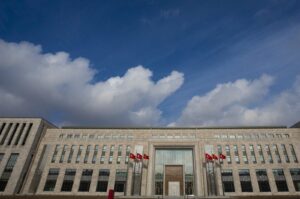

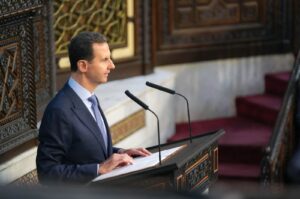
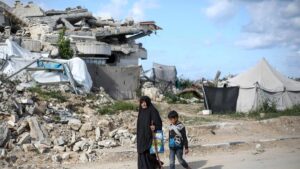
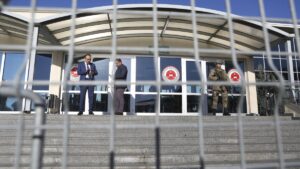
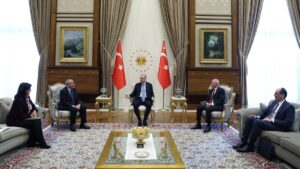
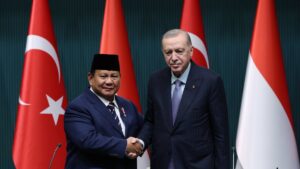

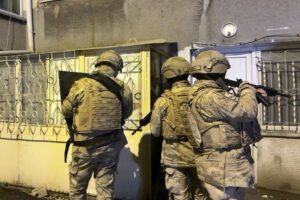
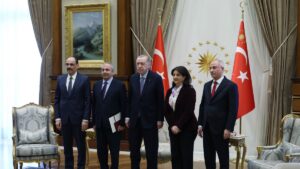

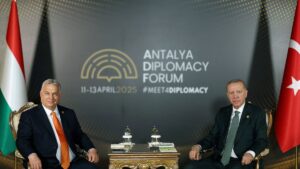
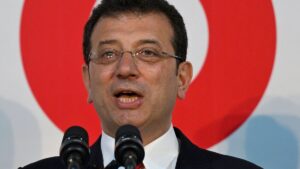

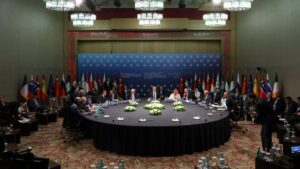







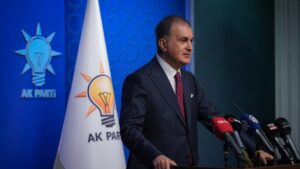

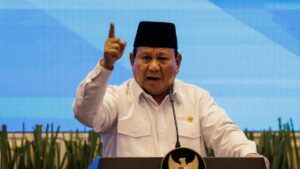

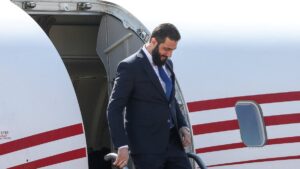

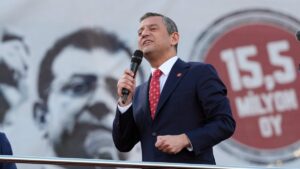
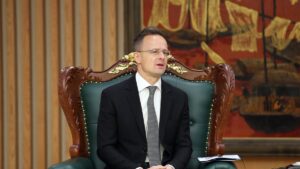
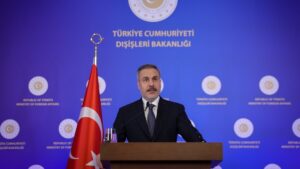
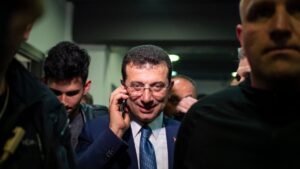


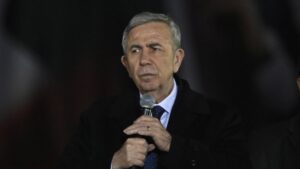

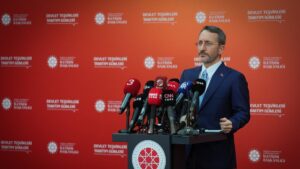





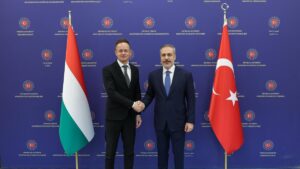
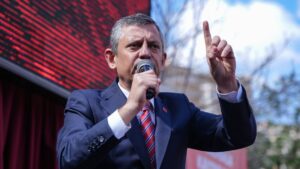


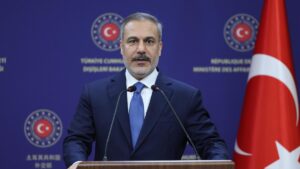
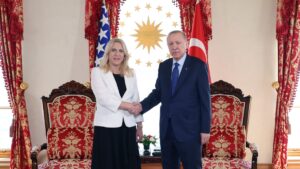
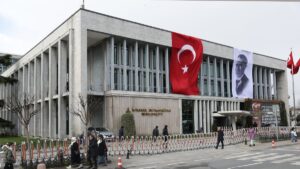

Be First to Comment